

Vol 55, No 7 (2019) DOI: Open Access Subscription Access Library Technology Reports (vol. 55, no. 7), “Protecting Privacy on Library Websites: Critical Technologies and Implementation Trends,” by Marshall Breeding This issue of Library Technology Reports (vol. 55, no. 7), “Protecting Privacy on Library Websites: Critical Technologies and Implementation Trends,” explores the issues and technologies needed to deploy a library website with adequate protections for the privacy of those who visit.

Without the implementation of standard encryption components, the online information-seeking activities of website visitors are vulnerable to exposure. Full Issue Table of Contents. Applying Library Values to Emerging Technology (a good source for choosing your own issue) Resources – Library Freedom. Big Mood Machine. Music is emotional, and so our listening often signals something deeply personal and private.

Today, this means music streaming platforms are in a unique position within the greater platform economy: they have troves of data related to our emotional states, moods, and feelings. It’s a matter of unprecedented access to our interior lives, which is buffered by the flimsy illusion of privacy. When a user chooses, for example, a “private listening” session on Spotify, the effect is to make them feel that it’s a one-way relation between person and machine. Of course, that personalization process is Spotify’s way of selling users on its product. But, as it turns out, in a move that should not surprise anyone at this point, Spotify has been selling access to that listening data to multinational corporations. Streaming Intelligence Surveillance In 2015, Spotify began selling advertisers on the idea of marketing to moods, moments, and activities instead of genres.
A Leviathan of Ads. "Age of You" with Curator Shumon Basar (September 4, 2019) The New Feudalism. How biased are our algorithms? Age of Surveillance Capitalism: “We Thought We Were Searching Google, But Google Was Searching Us” Aaron Swartz and MIT: The inside story. CAMBRIDGE — The mysterious visitor called himself Gary Host at first, then Grace Host, which he shortened for his made-up e-mail address to “ghost,” a joke apparently, perhaps signaling mischievousness — or menace.

The intruder was lurking somewhere on the MIT campus, downloading academic journal articles by the hundreds of thousands. Vol 55, No 1 (2019) DOI: Library Technology Reports (vol. 55, no. 1), “Artificial Intelligence and Machine Learning in Libraries,” Edited by Jason Griffey This issue of Library Technology Reports argues that the near future of library work will be enormously impacted and perhaps forever changed as a result of artificial intelligence (AI) and machine learning systems becoming commonplace.

It will do so through both essays on theory and predictions of the future of these systems in libraries and also through essays on current events and systems currently being developed in and by libraries. Internal Server Error. Google wants to know where you go so badly that it records your movements even when you explicitly tell it not to.
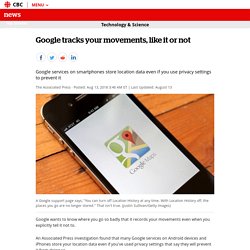
An Associated Press investigation found that many Google services on Android devices and iPhones store your location data even if you've used privacy settings that say they will prevent it from doing so. Computer-science researchers at Princeton confirmed these findings at the AP's request. Liz/90 How to retrain your shrinking attention span. My cakes were flat, dry, sunken, flavorless.

You name it. After taking careful inventory of my equipment and ingredients, I was forced to call myself into question: Was I reading the recipe carefully? How Smartphones Hijack Our Minds - WSJ. I Spy With My Digital Eye. Episode 5 I Spy With My Digital Eye.
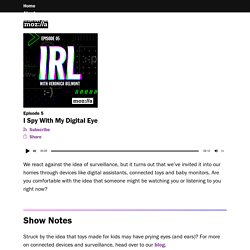
Growing Up with Alexa - MIT Technology Review. When it comes to digital assistants like Amazon’s Alexa, my four-year-old niece Hannah Metz is an early adopter.
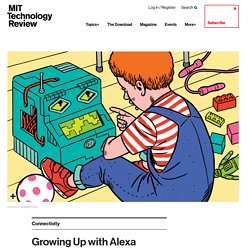
Her family has four puck-like Amazon Echo Dot devices plugged in around her house—including one in her bedroom—that she can use to call on Alexa at any moment. Google makes us all dumber: The neuroscience of search engines. In 1964, Pablo Picasso was asked by an interviewer about the new electronic calculating machines, soon to become known as computers.
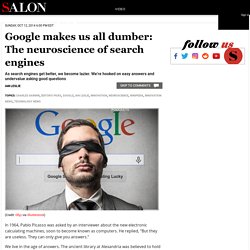
He replied, “But they are useless. They can only give you answers.” We live in the age of answers. The ancient library at Alexandria was believed to hold the world’s entire store of knowledge. The Future of Google, Search, and Ethics. How Has Google Affected The Way Students Learn? Americans' opinions on privacy and information sharing. Many Americans say they might provide personal information, depending on the deal being offered and how much risk they face Most Americans see privacy issues in commercial settings as contingent and context-dependent.
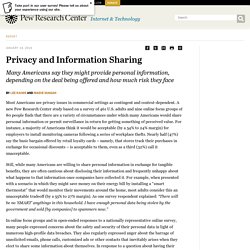
A new Pew Research Center study based on a survey of 461 U.S. adults and nine online focus groups of 80 people finds that there are a variety of circumstances under which many Americans would share personal information or permit surveillance in return for getting something of perceived value. For instance, a majority of Americans think it would be acceptable (by a 54% to 24% margin) for employers to install monitoring cameras following a series of workplace thefts. Nearly half (47%) say the basic bargain offered by retail loyalty cards – namely, that stores track their purchases in exchange for occasional discounts – is acceptable to them, even as a third (32%) call it unacceptable.
Have Smartphones Destroyed a Generation? - The Atlantic. Reilly reports: Emerging Ethical Dilemmas. For the fourth year in a row, the University of Notre Dame’s John J. Reilly Center for Science, Technology and Values has released a list of emerging ethical dilemmas and policy issues in science and technology. The 2017 list includes freezing brains and swarms of drones and highlights issues in robotics, neuroscience, education and medical management. In putting out the annual list, the center aims to present items for scientists, policymakers, journalists, teachers, students and the public to consider in the coming months and years as new technologies develop.
Pizza Surveillance film. Net Neutrality: Why School Librarians Should Care. On July 12, 2017, the American Library Association (ALA) and nearly 200 other organizations participated in Day of Action, a protest to save Net Neutrality. More Than A Quarter-Million Ask Google To Be Forgotten. NPR's Rachel Martin talks with Mona Chalabi of FiveThirtyEight.com about the "right to be forgotten" — requests to Google to remove evidence of one's digital footprint from the search engine. UNIDENTIFIED WOMAN #1: Fifty-two. UNIDENTIFIED WOMAN #2: Four-hundred-and-fifty-three. UNIDENTIFIED MAN #1: Twenty-five. TEDxEast - Tim Wu - How to build an information empire.